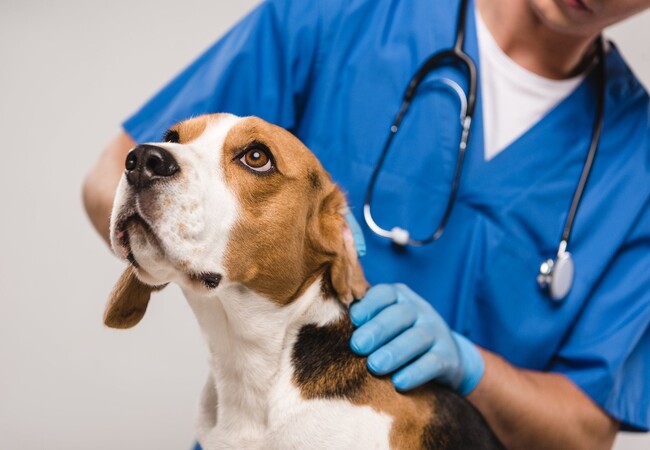Ascariasis in Dogs: Veterinary Guide & Prevention 2025 🐛🩺🐾

In this article
Ascariasis in Dogs: Veterinary Guide & Prevention 2025 🐛🩺🐾
By Dr. Duncan Houston BVSc
Hello! I’m Dr Duncan Houston BVSc, veterinarian and founder of Ask A Vet. In this 2025 guide, we explore ascariasis—a common roundworm infection in dogs, especially puppies. Also called toxocariasis or ascaridiasis, this parasitic disease affects canine health and poses rare risks to people. Read on to learn about lifecycle, signs, diagnostics, treatment, and prevention strategies, including support from Ask A Vet. 🐶💙
1. What Is Ascariasis? 🧬
Ascariasis is an infection with roundworms—intestinal parasitic nematodes like Toxocara canis or Toxascaris leonina. In dogs, it’s commonly called roundworm infection. The life cycle involves egg ingestion, larval migration through the lungs, and development into adults in the intestine.
2. Epidemiology & Transmission 🌍
- Puppies are at highest risk due to transmission from their mother through the placenta or milk.
- Eggs shed in feces become infectious after ~2–4 weeks in warm, moist environments.
- Dogs may also ingest larvae by eating rodents or paratenic hosts like earthworms or birds.
- Adult dogs often have encysted larvae, but pregnant dogs can reactivate and infect their litters.
- Rarely, dogs can acquire Ascaris suum from pigs, as documented in China.
3. Clinical Symptoms: What to Watch For 🔍
- 🐽 Pot-bellied appearance: due to large worm loads.
- 💧 Diarrhea or vomiting (sometimes with worms visible).
- 📉 Stunted growth, poor body condition, dull coat.
- 💨 Coughing or respiratory signs during larval migration.
- ⚠️ Heavy infestations can cause intestinal blockage—rare but serious.
4. Zoonotic Risk: Toxocariasis in Humans 🧒
Humans may accidentally ingest infective eggs (from contaminated soil or poor hygiene), leading to larval migration through organs (visceral, ocular, or neurological disease). Preventive hygiene—hand washing, disposing of feces, and discouraging pica—is critical.
5. Diagnosis in Dogs 🔬
- 💩 Fecal flotation to detect eggs is the gold standard.
- 👁️ Direct observation of worms in feces or vomit confirms heavy infestation.
- 🐾 Puppies may require repeated testing due to repeated larval development.
- 🩺 Larval migration may cause transient respiratory distress—consider lungs on X-ray if coughing persists.
6. Treatment Options 🛠️
- 💊 Dewormers: pyrantel, fenbendazole, milbemycin—multiple doses recommended due to life cycle.
- 👶 Puppy schedule: Start at 2 weeks old, repeated every 2 weeks until 8–12 weeks, then monthly until 6 months.
- 🤰 Pregnant dogs: Deworm at days 40 and 55 gestation, and 2 weeks postpartum.
- 📅 Adult dogs: Monthly prevention via heartworm medication offers ongoing control.
- ⚠️ Severe infection: Treat dehydration/nutritional support; possible hospitalization if obstructed.
7. Prevention Strategies 🛡️
- 🧹 Pick up feces promptly (daily)—eggs survive weeks to years in soil.
- 🛡️ Use vet-recommended monthly preventives (with roundworm efficacy).
- 🚫 Prevent puppies from eating rodents, soil, or feces.
- 🧴 Wash hands after handling puppies or cleaning waste bins.
- 🏫 Control exposure in public play areas—educate community on zoonotic risk.
8. Support Tools: Ask A Vet,💡
- Ask A Vet: Teletriage and diagnosis support, deworming plan guidance, proactive reminders.
9. Monitoring & Prognosis 📊
- 🐾 With timely treatment, most dogs recover fully—however repeated monitoring is essential.
- 🔁 Recheck fecals 2–4 weeks post-treatment, and adjust prevention in high-risk dogs.
- ✅ Puppies often regain growth quickly once treated and supported nutritionally.
10. When to Contact Your Vet 🚨
- 📅 Puppies showing diarrhea, poor weight gain, or pot-belly despite treatment.
- 🩺 Persistent cough or vomiting worms.
- 🚑 Signs of dehydration, bloating, or lethargy.
- 🧒 Household member develops unexplained fever, vision changes, or cough—zooonotic concern.
11. Final Thoughts 📝
Ascariasis is preventable and treatable, and should never be overlooked, especially in puppies. With smart hygiene, monthly prevention, and early diagnosis, roundworm infections can be effectively controlled—in 2025 and beyond. Leveraging expert guidance from Ask A Vet, ensures your dog's health and household safety. 🐾💙🌟






